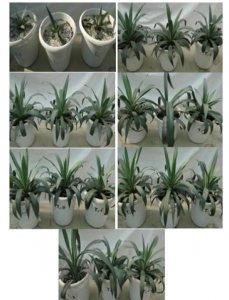Task-1.8 :
Bio-engineering – A phytoremediation option for the mitigation of landslide and slope stability problems in the hilly regions
Task Leader:- Asha A. Juwarkar
Objective:
The aim of the proposed study is to integrate live materials, mainly plants and microorganisms, to address the problems of environmental management and sustainable development and utilization of vegetation, may be alone or in combination with geotechnical or civil structures, for protection of slopes by reducing and controlling factors that cause instability. The aim and objectives includes:
- Evaluation of physico-bio-chemical characteristics of soils of the landslide prone area at hilly region.
- Optimize various soil amendments for improving the properties of soils of the landslide prone area to facilitate plant establishment and growth.
- Isolation and screening of microbial strains and develop effective microbial consortium for improvement of rhizosphere of the plant.
- Selection of plant species that can with stand the existing hydrological conditions of the terrain at landslide prone area.
- Preparation of design and appropriate blends of organic wastes, soil, microbes and plant.
- Establish on-site field trial demonstration of the bioengineering method for mitigation of landslide prone area.
Scope of Work:
- Selection of the site and collection of baseline data with respect to the present status of experimental site.
- Evaluation of soils of landslide prone area for physical, chemical and microbiological properties to assess supportive and nutritive capacity.
- Delineation of appropriate blends of organic waste(s), soil and biofertilizers to develop a rhizopshere of good nutritive and supportive capacity.
- Isolation and screening of specialized strains of mycorrhizal fungi and biofertilizers accordance with the suitability for the landslide prone area.
- Mass culture of plant specific biofertilizer and mycorrhizal fungi.
- Preparation of design and delineation of appropriate blends of organic waste(s), soil and biofertilizers to develop a rhizopshere of good nutritive and supportive capacity
- Plantation on the landslide prone area including plain and slope areas using identified blend and biofertilizers inoculum.
- Afforestation with suitable plant species of high ecological and economical value and adaptable to local conditions will be undertaken at the rate of 2000 – 2500 plants per hectare.
- Periodic evaluation of rhizosphere development for physical, chemical and microbiological parameters.
- Monitoring of growth response in different plant species periodically and identification of corrective measures, if necessary.
- Performance of bioengineering method to evaluate its cost efficiency at sites where it is being implemented or considered.
- Development of process for mitigation of landslide and slope stabilization through through bioengineering method.








